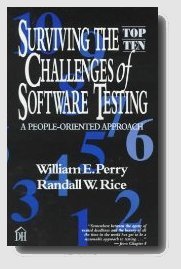2 Days
Register for the Online Version
"Excellent Course!" - Scott Groff
"I will be able to put this information to good use, and very entertaining!" -Jay Ryan
This is a quick start course in software testing for people just getting into the field, or for people who just need a refresher course or validation for their current testing techniques. This is a practical hands-on seminar to cover the critical path of testing. Your instructor will be a certified instructor in the QA and testing field. You will learn the terminology, process, and challenges of testing in the real world. As a result of attending this seminar, you should have a good working knowledge of software testing and what it takes to design and conduct an effective test of software, regardless of the technology.
Basic Training in Software Testing will help you become more comfortable and confident in testing software applications at just about any level of detail: unit, integration, system, and user acceptance. You will emerge from this two-day session knowing how to develop test cases and test plans. You will also leave with a knowledge of how tools can help you perform testing.
Sometimes people feel intimidated by the technical aspects of software testing and lack the confidence they need to be credible test leaders in their organization. Learn the issues and processes for effectively testing software by attending this hands-on course.
-
Learn how to find costly and embarrassing problems before your customers find them.
-
Understand the key issues in testing software applications.
-
Learn how to design tests that adequately cover requirements and business events.
-
Get the most out of your existing investment in testing and how to leverage that investment.
-
Advance your career by reinforcing your testing expertise.
-
Test analysts
-
Testers
-
Web developers
-
Mainframe and client/server developers making the transition to web development.
The program requires only basic IT knowledge or experience. Testing knowledge or experience is not a pre-requisite.
Program Information
This course is presented on an in-house basis only unless offered as a special public course. Contact us for information about how to bring this course into your organization.
Topics
Module 1 - Surviving The Top 10 Challenges of Software Testing
-
The Top 10 Challenges
-
Solutions to Each Challenge
Module 2 - Terminology
-
The Deming Workbench Model
-
Software Life Cycle
-
Test Terminology
Module 3 - The Economics of Testing
-
Where Defects Originate
-
Where Testing Resources are Used
-
The Relative Cost of Fixing Defects
Module 4 - Basic Test Planning
-
Basic Testing Principles
-
The Basic Testing Process
-
What is a Test Strategy?
-
The Components and Format of a Test Strategy
-
Identifying Critical Success Factors
-
Defining Test Objectives
-
The Components and Format of a System-level Test Plan
-
Major Elements of a Test Plan
-
How Much Time Should be Spent on Test Planning?
-
Planning Time Guidelines
-
Tips for Test Planning
Module 5 - The Test Planning Process
-
Key Test Planning Components
-
Major Test Planning Tasks
-
Developing a Test Strategy
-
Critical Success Factors
-
Defining Test Objectives
-
Identifying Needed Test Resources
-
Planning the Test Environment
-
Defining the Test Procedures
-
Identifying the Functions To Be Tested
-
Identifying the Interfaces With Other Systems or Components
-
Writing Test Scripts
-
Defining Test Cases
-
Designing Test Data
-
Building a Test Matrix
-
Determining Test Schedules
-
Assembling the Information
-
Finalizing the Test Plan
Module 6 - Test Case Development
-
Key Test Planning Components
-
Test Scripts
-
Test Cases
-
How to Document Test Cases
-
-
Types of Test Cases
- Functional
- Boundary
- Equivalence
- Requirements-based
- Business-oriented
- Behavioral
- Structural
- Logic-based
- Behavioral
-
Ways to Design Functional Test Cases
- Boundary Value Analysis
- Equivalence Classes
- Requirements-based Cases
- Error Guessing
- Business-oriented Cases
- Transaction Threads Based on Business Scenarios
- Test/Cycle Matrix
- What is a Test Cycle?
- Why Use Test Cycles?
- Use Cases
- Use Case Components
- Structural Test Cases - Logic-based
- Structural Test Coverage Levels
- Structural Test Cases - Behavioral
- Regression Test Cases
Module 7 - Test Execution Strategies
-
Automated Testing
-
Risks of Not Automating Testing
-
Risks of Automating Testing
-
Where Do Tools Fit In?
-
The Major Issues
-
“Top 10” Test Tools
-
Critical Success Factors
-
-
Test Execution - Manual MethodsBuilding the Test Environment
- Test Folders
- Test/Function Matrix
-
How to Create and Maintain Test Data
-
The Process for Configuration/Release Management
-
Pitfalls to Avoid
Module 8 - Regression Testing
-
What is Regression Testing?
-
No Regression Testing: Hidden Defects
-
Regression Testing: No Hidden Defects
-
Regression Testing - The Process
-
Regression Testing - What’s Needed?
-
Regression Testing Issues
-
Regression Testing - How Much is Enough?
-
Tips for Performing Regression Testing
Module 9 - Test Evaluation and Reporting
-
Prerequisites for Test Evaluation
-
Test Evaluation and Reporting Process
-
Test Reporting Attributes
-
Types of Test Reporting
- Defect Reports
- Status Reports
- Final Report
-
System Test Evaluation - Defect Reporting Status Reporting
- Paper-based
- Defect Tracking Tools
- The Role of the Defect Administrator
- The Defect Life Cycle
- Defect Tracking - Things You Need to Know
- Sample Defect Categories
- Sample Defect Priorities
-
Final Reporting
-
Test Summary Report
-
How Can This Data be Used?
Resources
-
Checklists and Templates
-
Glossary
-
Bibliography
-
Course notebook with slides, worksheets, checklists, complete examples and supporting text
-
You will have the basic information needed to plan and execute an effective test of a software application.


